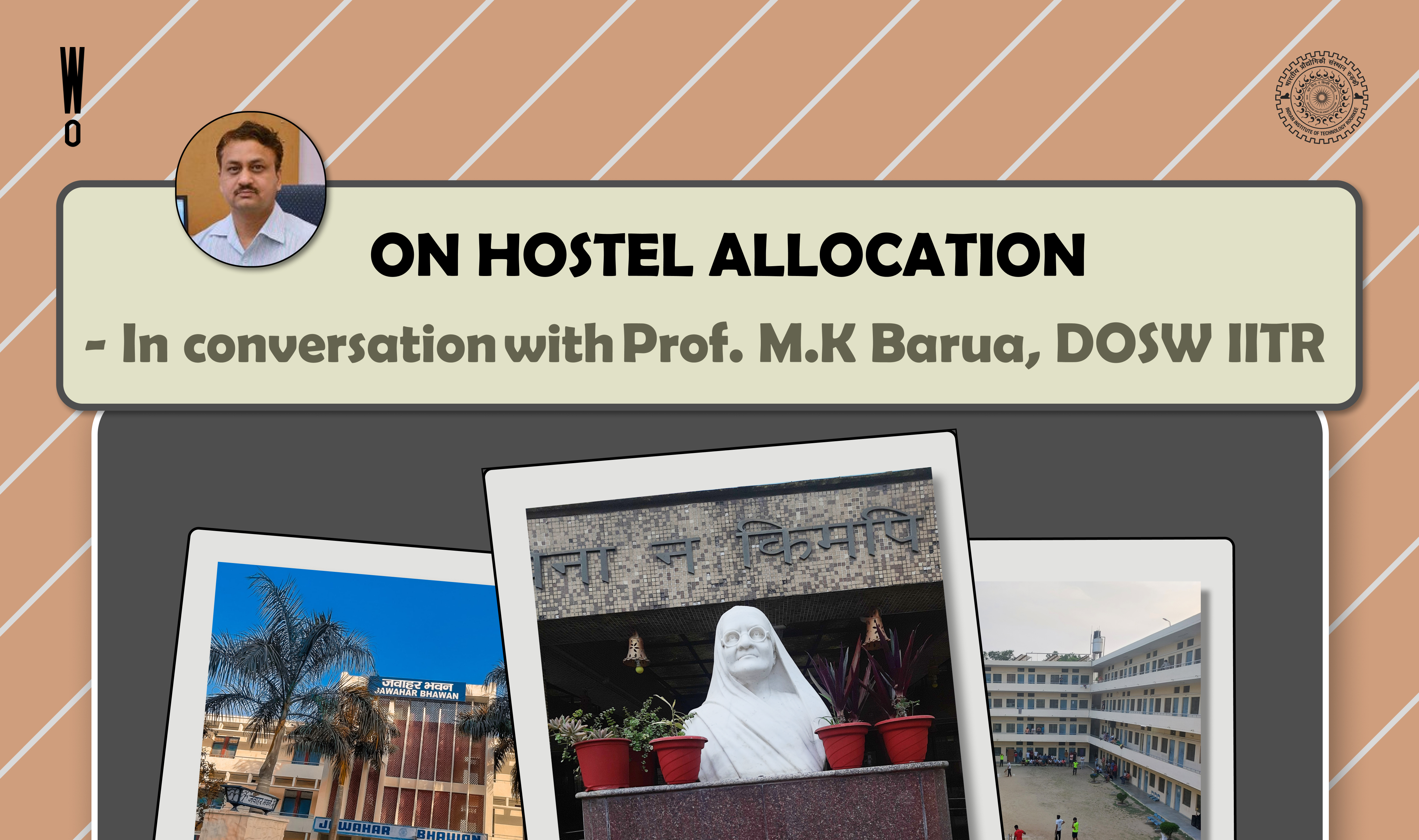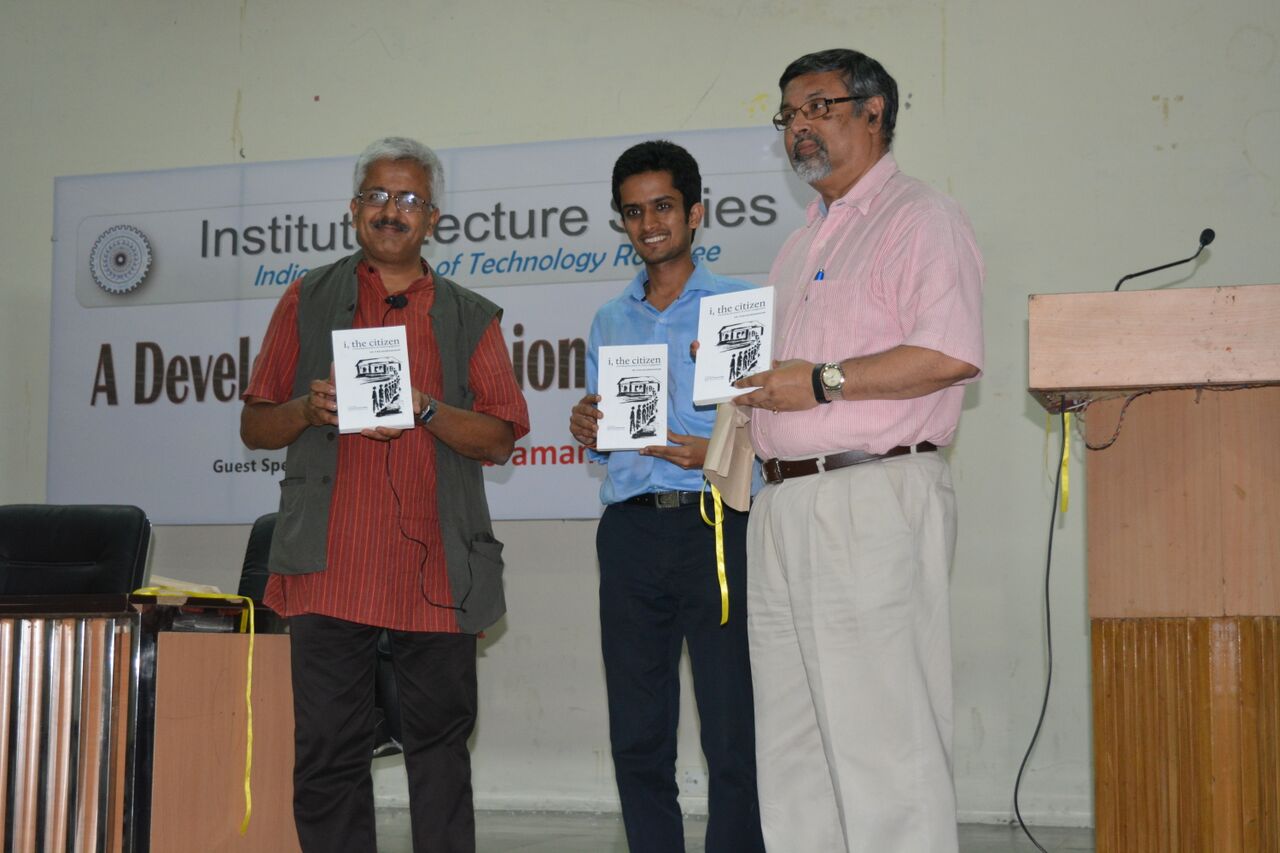

Body of IITR

Last Thursday was one of those rare evenings which witnessed the O.P. Jain Auditorium packed with ears, eyes and conscience, learning and listening, to a brilliant talk delivered by Dr. R Balasubramaniam.
Dr. Balu, a physician by qualification and a humanist by instincts, has been an activist for more than three decades. His constructs of social movement to uplift the rural and tribal sects of our nation are in tandem with his academic accolades. He holds a Masters in Public Administration from the Harvard Kennedy School and was a Frank H T Rhodes Professor at Cornell University. He continues his professorship at some of the most distinguished centers of education. The talk captivated the audience with Dr. Balu discussing at length the need to balance ‘development’ with human capital growth and general living standards, before seeking digitalization and high GDP indicators. He focused on the importance of making our villages self-sufficient and gave statistical justification with his successful developmental work for people of Saragur in Mysore. The talk was followed by the launch of his book “I, the citizen” by our Director, Prof. Banerjee. Afterwards, WatchOut! had the privilege of an interview with Dr. Balu on a joint panel with Geek Gazette. Here are excerpts from the same.
Panel- At the age of 19 you founded the Swami Vivekananda Youth Movement, what spurred you to become an activist? Was there one defining moment that developed the radical in you?
R Balu: There is a huge personal story. I got 99.67% in PCM. I wanted to get into an IIT, become an engineer, but I wasn’t as intelligent as you, I could not crack the exam. So I thought I would get into REC (now it is called NIT Surathkal). So I went there for my interview, I was waitlisted at 1. I wanted Computer Science because everybody in my generation wanted Computer Science. But there was only one seat for general merit and the guy with 100% got that. I was very disappointed so I just took some college in Bangalore called BMS College. When I went there I was so badly ragged that I never had the courage to go back to college the next day. Just near the college there was Ramakrishna Mission. So I went there, thought I would just loiter around and tell my parents that I am going to college. No courage to go to class, no money to go to the theatre; I spent some time at the mission, two days later, the swamijis there thought that I had come there to steal something so on the 3rd day I went into the library. And there I discovered Vivekananda - Changed my life! There are 2 books by Vivekananda that I read at the library: ‘Rousing Call to Hindu Nation’ and ‘My message to the Youth’, and I would say that every young man should read them!
Panel- You have been teaching at some of the top notch universities in US and India. How are the students at both places different?
R Balu: I think it’s the way our education system functions. I teach a course for undergraduate students at Cornell. I teach the same course for graduate students in India (business school in Mysore). I don’t change anything - my content, quality, way of expression; it’s all the same. Every day after my class, I ask my students to write a reflection note. How did the lecture affect you? What was your mental mechanism during the lecture? If you give me two notes without names, I can tell which one is of an Indian student and that of an American student. An American student will actually reflect on what I spoke. Reflective thinking is ingrained in the educational system, at least in the USA. In India, repetitive thinking is ingrained. Nobody needs to teach you reflection. You can start reflecting right now. If I were to ask you what I spoke today, you would write it very nicely. But if I ask you how did it impact you, how did it change your life, you won’t process it with the same competence. I am not saying repetition is bad, but reflection is better. So if Indians reflect as they repeat, the sky’s the limit.
Panel: Even though we have large scale policies like Sarva Shiksha Abhiyan for imparting education, we lack able teachers to implement them. What should we do to improve the standards of education in the country?
R Balu: The simple problem is that we don’t look at teachers as an important component of the society. You give me a salary of 3000 rupees and want me to live in a village, educating children, I am not worried about the child’s human capital I am worried about my own survival. So till we restore dignity in teaching, till we make it commercially equivalent to what a corporate professional with equivalent abilities will earn, it will be very difficult to get good motivated teachers. Why should a teacher who is creating the future of India get a menial salary? I think the socio-economic rewards should be visibly present more than just assuming that the teacher will be inspired to teach. See everybody is not here for the passion, we have a few passionate teachers but that does not bring about a change. So I think the fundamental prescription for India should be on how to make teaching profession get back its dignity, not just from a social construct, but also from an economic construct.
Panel: As one of the elementary commitments of GRAAM*, you aim to impart education in villages. What is your vision to catalyse art and social sciences in the country and to bring them to a level equivalent to technical subjects in the curriculum?
R Balu: I think we need to understand that education is a combination of cognitive abilities. We’re only focusing on maths, science etc. If you come to my school, it has got no doors or windows. It is an open structure. We create learning spaces. Our teachers are not called teachers, they are called Learning Facilitators, and they are expected to facilitate the balanced development of a child. And what do we facilitate is the acquisition of 5 basic intelligences- musical intelligence, mathematical intelligence, linguistic intelligence, intrapersonal intelligence, and interpersonal intelligence. We use different learning mechanisms to acquire these. If the child has acquired these intelligences then he has got the ability to acquire any information related to any field. We make our schools learning spaces, instead of making them teaching environments. Today we are only employing teachers, I want them to create impact educators. That’ll bring the fundamental paradigm difference.
Panel- Let’s say India was in anarchy, and you were suddenly appointed as the sole ruler. What would be the one change you would like to bring about the most?
R Balu: I would give dignity back to Indians. I would make every Indian feel proud of the fact that he is an Indian. I would move the people away from a right based approach to a responsibility based approach. We all think of being an Indian as a matter of right, I think being an Indian is a matter of responsibility. It is what we need to give back, not what we need to take.
Panel- Do you have any last message you would want to give to the students of IIT-R?
R Balu: Learn to operate beyond the zones of your competence. Don’t get stuck in the grooves of competence. Get out of your zones of comfort, and India would be a better place.
*Dr. R Balasubramaniam is the Chairman of the Grassroots Research and Advocacy Movement (GRAAM), a public policy research and advocacy initiative based in Mysore.